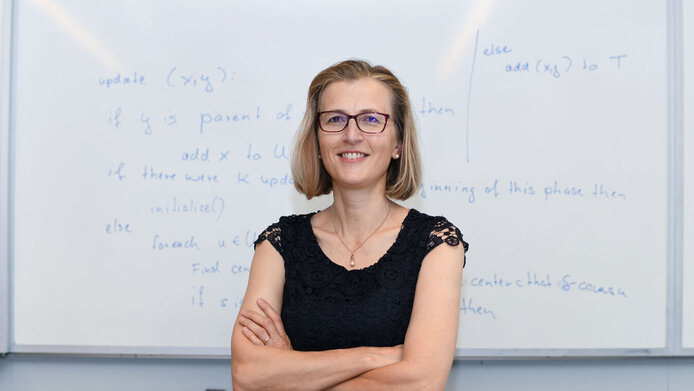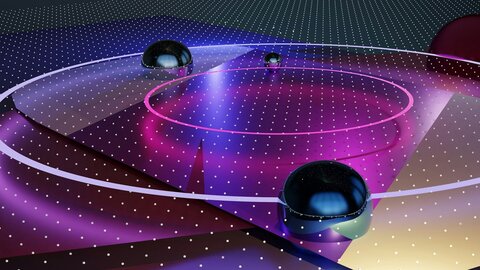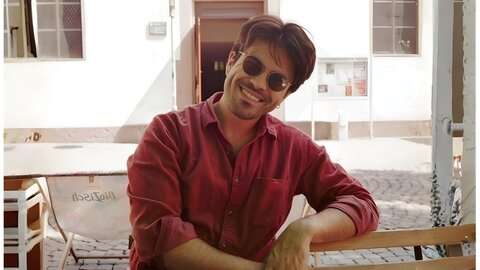New algorithms for better privacy protection

What answers do you hope your research will be able to provide in the coming years?
Monika Henzinger: I am currently redefining the focus of my research. Up to now, I have mainly worked on algorithms for processing large amounts of data, which one wants to be as fast as possible. Now I want to develop algorithms that should still be fast, but at the same time will guarantee the protection of privacy. Queries that evaluate large amounts of data should fulfil the additional condition of not disclosing information about particular individuals under any circumstances. Therefore I'm trying to develop programmes that will verifiably protect the privacy of each individual.
Can you give us an example?
Henzinger: There is the well-known case of William Weld. In the 1990s, when he was Governor of the State of Massachusetts, Weld promoted a database that provided access to anonymised hospital data of public employees. A student was able to demonstrate that she could retrieve the medical history of a specific individual despite the lack of direct identifiers – she used Weld himself as an example – by simply linking the information with other data that was freely accessible.
How can the data be masked so that privacy is securely protected?
Henzinger: When performing a query, the novel algorithm slightly changes and distorts the data. Statistically speaking, these changes are irrelevant, since the answers derived from large sets of data about groups of people still have a high information value. The distortion, however, hides the information on specific individuals so well that their privacy is guaranteed – even if you cleverly combine different data sources. This concept is called “differential privacy”.
What will your first steps be after receiving the Wittgenstein Award?
Henzinger: The first step will be to expand my research group. In addition, I would like to do more in terms of inviting experts to Vienna, organising workshops, establishing contacts with researchers at other universities – all of this contributes to the objective of learning from one another. These steps will help me to make more rapid progress in my research. I also want to try and use my influence to create new career positions. This is a better way to attract more qualified and experienced researchers than by offering only temporary positions. As part of the “Distinguished Visiting Austrian Chair Professorship”, I will also be spending the next six months at Stanford University – inter alia to exchange ideas with the research and business community there on the issue of differential privacy.
What does the Wittgenstein Prize mean for your research?
Henzinger: It’s a great boost and ensures greater visibility for my research in particular and for computer science in Austria in general. That is very valuable, because we urgently need a greater number of talented students who understand that you can change the world with computer science – and who want to do just that. In addition, the award shows that women, too, can have a successful career in computer science, and I hope this will encourage more young women to study computer science.
What is the source of motivation for your research?
Henzinger: Science is a passion. I discovered my own passion for it when I happened upon a popular science magazine in my school days, and it has never lost its fascination for me. There are always lean periods where you only discover things that don't work. But you learn something new even from these disappointments. For me, research is exciting – like permanently trying to solve a Sudoku puzzle. It's really an inner compulsion: if you let me choose on a rainy Sunday afternoon whether I want to watch a movie or read a scientific article, I'd rather read the article. I find it more intriguing.
Monika Henzinger was appointed professor at the University of Vienna in 2009. After studying computer science in her native country, Germany, she acquired a PhD at Princeton University, USA, and held an assistant professorship at Cornell University. An interim spell in the private sector culminated in Henzinger's appointment as research director at Google. She then returned to university life as professor at EPF Lausanne, Switzerland, from where she eventually moved to Vienna. She has authored over 200 scientific papers and holds more than 80 patents. She has received numerous scientific awards, including two Advanced Grants from the European Research Council, which she received in 2014 and 2021. At present, Henzinger is also the principal investigator of the FWF-funded project “Fast Algorithms for a Reactive Network Layer”, which received a netidee-SCIENCE award from the Internet Foundation Austria.
About the project
In her research group at the University of Vienna, Theory and Applications of Algorithms, Monika Henzinger specialises in the development and analysis of algorithms, inter alia in the area of big data analysis. Her fields of research include algorithms for combinatorial problems, especially in graphs, distributed and parallel computing, computer-assisted verification, and algorithmic game theory. A new focus area for Henzinger is differential privacy, which provides provable protection of personal information within large data sets.
The Wittgenstein Award
The Wittgenstein Award, Austria’s most generously endowed science award, is bestowed on outstanding researchers of any discipline. Endowed with EUR 1.5 million, the award supports the winners in their research, guaranteeing them the utmost freedom and flexibility and enabling them to develop their research activities at the highest international level.





